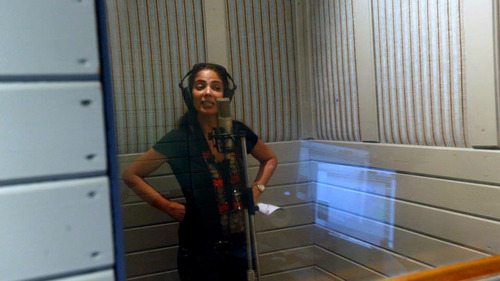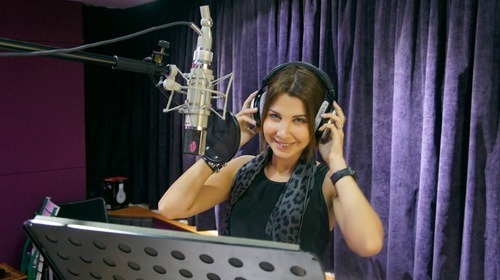Nancy Ajram’s latest hit speaks to women’s courage and worth, and is chosen as theme song to the forthcoming radio fiction “Worth 100 Men” (“B 100 Ragl”).
The recent release of Nancy Ajram’s new song “Banouta B 100 Ragl” (“A Girl Worth 100 Men”) on radio stations across the Middle East and North Africa and in digital music stores is bound to fuel conversations on women’s empowerment in the Arab world. The song has been selected as theme track for a forthcoming radio fiction series called “Worth 100 Men” (“B 100 Ragl”) starring Mona Zaki and Mahmoud Abdul Moghny, to be aired on radio stations in the region this fall. Both the song and the radio fiction series aim to create awareness to the main issues affecting women across the region, while at the same time inspiring them to bravely take charge of their lives and achieve their aspirations.
The highly anticipated new song is produced by the Womanity Foundation (www.womanity.org) in association with Radio NISAA FM in Palestine (www.radionisaa.net) and with Global Productions in Egypt, who are also producing the radio fiction series. “Banouta’s” lyrics are by the award-winning writer Amir Taema, and the music is by Lebanese composer and arranger Jean-Marie Riachi. (Click here to hear the song http://youtu.be/o1EOcpc3Ldc )
(…) I am brave and worth 100 men
and in times of distress I fight back
I resolve problems rather than make them
I am the secret of the universe
I am the “SHE” that completes the “HE”(…)
Nancy Ajram sings to an up-beat rhythm.
In the same dynamic and compelling manner, the radio fiction series “Worth 100 Men” presents a highly entertaining story, enacting the challenges Arab women face in society, and the creative and courageous solutions they find to surmount them.
“ ’Worth 100 Men’ aims to inspire women to go beyond what they are told they can be, to encourage them to overcome their challenges and become stronger,” said Yann Borgstedt, president of Womanity. “We believe we are touching on something that people want to talk about and we are excited to have sparked this transformative conversation.”
The radio fiction series will be accompanied by public debates around essential topics relating to women’s role in society and the problems they encounter, to encourage audiences to contribute their own experiences and opinions. The debates will be animated on radio, social media and in real-life community settings. In anticipation of the broadcasting of the radio fiction series, conversations around issues affecting women are already taking place on social media (see www.facebook.com/B100Ragl ).
Mona Zaki, who plays the lead role of Noha in “B 100 Ragl”, a young radio journalist with a mission and a mind of her own, declared: “I am really happy to be working on such an exciting project. Arab Women – although strong by nature – need a lot of support and inspiration to empower themselves to succeed and develop. This story does just that.”
In collaboration with the consortium “Pop Culture with a Purpose”, led by Oxfam and Soul City, and with the support of the UN Trust Fund to End Violence against Women, the project also involves Egyptian organizations working on gender justice and women’s rights by building their capacity to use fiction to foster social change. This will include moderating listening sessions and debates around the issues raised by the show. Moreover, the Egyptian groups, such as the Center for Egyptian Women’s Legal Assistance and Better Life will be trained and then tasked to monitor, evaluate and report on the social impact of “Worth 100 Men” on its Egyptian audience.


